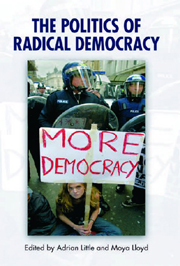Book contents
- Frontmatter
- Contents
- Acknowledgements
- Notes on the Contributors
- Introduction
- 1 Rhetoric and Radical Democratic Political Theory
- 2 Performing Radical Democracy
- 3 Aboriginal Sovereignty and the Democratic Paradox
- 4 Judith Butler, Radical Democracy and Micro-politics
- 5 Post-structuralism, Civil Society and Radical Democracy
- 6 Hegemony and Globalist Strategy
- 7 Is ‘Another World’ Possible? Laclau, Mouffe and Social Movements
- 8 Friends and Enemies, Slaves and Masters: Fanaticism, Wendell Phillips and the Limits of Agonism
- 9 The Northern Ireland Paradox
- Conclusion
- Bibliography
- Index
3 - Aboriginal Sovereignty and the Democratic Paradox
Published online by Cambridge University Press: 12 September 2012
- Frontmatter
- Contents
- Acknowledgements
- Notes on the Contributors
- Introduction
- 1 Rhetoric and Radical Democratic Political Theory
- 2 Performing Radical Democracy
- 3 Aboriginal Sovereignty and the Democratic Paradox
- 4 Judith Butler, Radical Democracy and Micro-politics
- 5 Post-structuralism, Civil Society and Radical Democracy
- 6 Hegemony and Globalist Strategy
- 7 Is ‘Another World’ Possible? Laclau, Mouffe and Social Movements
- 8 Friends and Enemies, Slaves and Masters: Fanaticism, Wendell Phillips and the Limits of Agonism
- 9 The Northern Ireland Paradox
- Conclusion
- Bibliography
- Index
Summary
Against Jürgen Habermas, Chantal Mouffe insists that there is no necessary conceptual relation between democracy and human rights but only a contingent historical relation. Moreover, these principles are fundamentally irreconcilable: while democracy presupposes an historical act of exclusion in the political constitution of a demos, human rights presupposes a universally inclusive moral community. Yet, Mouffe argues, the accommodation of these conflicting legitimating principles within a liberal democratic regime is productive. Although irreconcilable, their paradoxical articulation keeps the limits that enable democratic deliberation and decision-making in view for being political and, therefore, contestable. Radical democracy, she argues, is premised on the recognition and affirmation of this ‘democratic paradox’.
In this chapter I examine whether a commitment to radical democracy requires that we affirm Mouffe's account of the democratic paradox. Might one be a radical democrat and yet understand human rights and popular sovereignty to be co-original as Habermas does? Specifically, I want to consider what is at stake politically in conceptualising the relation between these two legitimating principles of modern regimes. I will suggest that what is at stake is the representation of political claims. To understand human rights and democracy as ‘co-original’ in the way that Habermas proposes is to peremptorily exclude radical political speech and action that would fundamentally contest the terms of political association. For it diminishes the representational space in which a claim could be articulated that would contest the particular determination of the ‘we’ that authorises that order in the first place.
- Type
- Chapter
- Information
- The Politics of Radical Democracy , pp. 52 - 72Publisher: Edinburgh University PressPrint publication year: 2008



